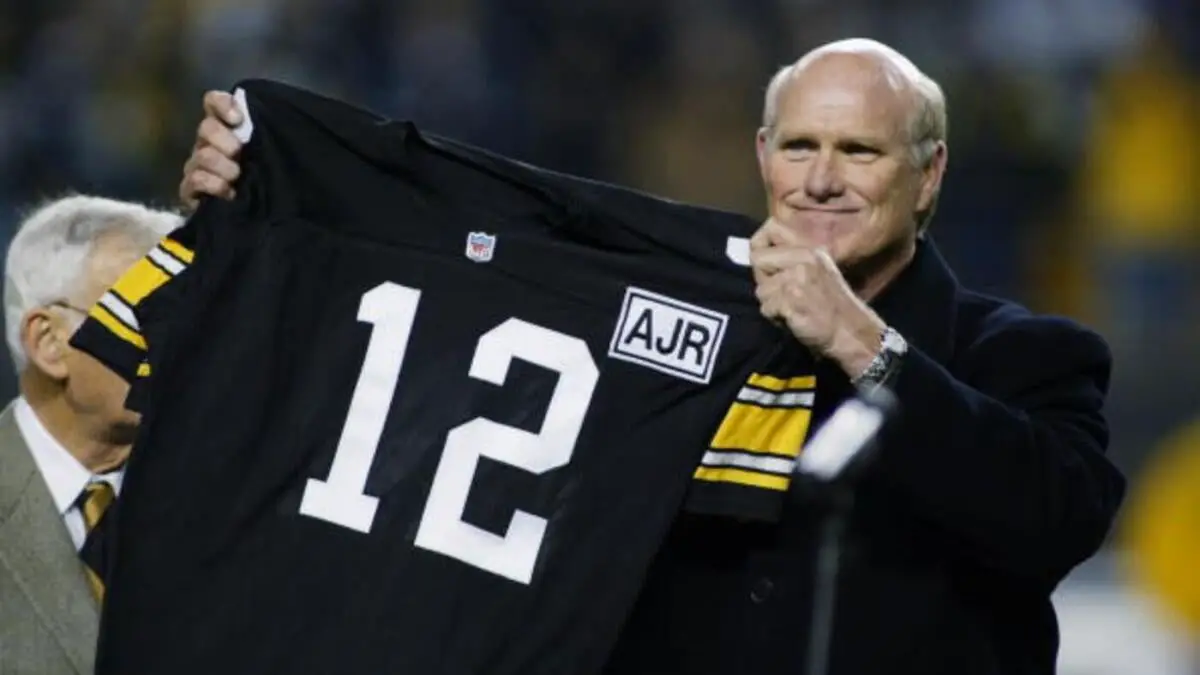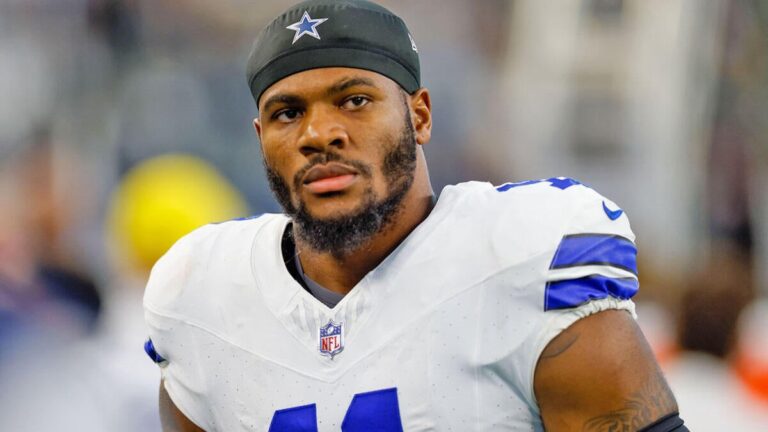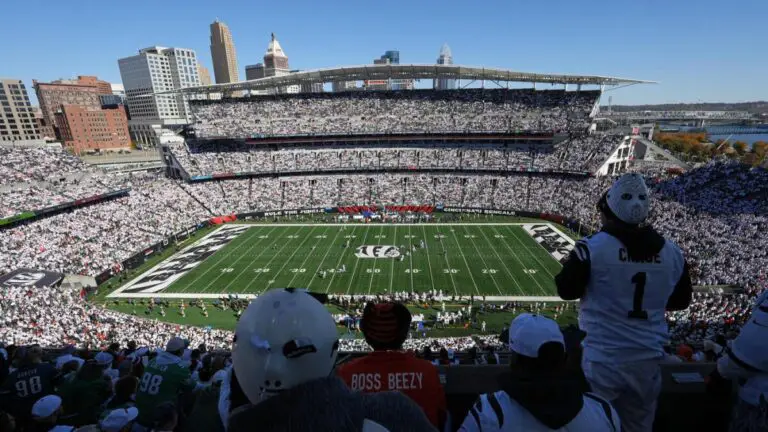

One former player for every NFL team who should have their jersey number retired
One former player for every NFL team who should have their jersey number retired
Outside of getting a statue, there’s no higher honor in professional sports than having your number retired. That honor was recently bestowed upon former Washington Commanders Hall of Fame receiver Art Monk, who this season will become the sixth player in franchise history to see his number officially get taken out of circulation by his former team.
While Monk will get his proper due this fall, there are scores of notable former players who have still not had the honor of seeing their numbers retired. While most NFL teams have retired numbers, six NFL teams (the Cowboys, Raiders, Falcons, Texans, Ravens and Saints) do not despite having several former players who are certainly deserving of the honor. New Orleans had two retired numbers, but those numbers were unretired following an ownership change. The Saints, like many teams, have instead opted to no longer put specific numbers into circulation.
Below is a rundown of each NFL’s team’s most deserving former player who should have their number retired by their former organization. While some of these decisions were easy, many were not.

Arizona Cardinals: WR Larry Fitzgerald — No. 11
It’s expected that Fitzgerald will receive this honor at some point. Fitzgerald (whose last season was back in 2020) is also expected to receive induction into the Pro Football Hall of Fame next summer in what will be his first year of eligibility.

Atlanta Falcons: QB Matt Ryan — No. 11
While Julio Jones received some consideration, it seems only right to give this one to the only player in franchise history that has won a league MVP. That year, Ryan also led the Falcons to the brink of what would have been their first Super Bowl win.

Baltimore Ravens: LB Ray Lewis — No. 52
Baltimore had several candidates, but the obvious choice was Lewis, a former Super Bowl MVP, two-time Defensive Player of the Year and the only Raven to play a role in both of the franchise’s Super Bowl wins.

Buffalo Bills: WR Andre Reed — No. 83
Former teammates Jim Kelly, Thurman Thomas and Bruce Smith already have their numbers retired, so it’s only right that Reed joins them. A fellow Hall of Fame inductee, Reed earned seven straight Pro Bowl selections while playing a signifiant role in Buffalo’s run of four straight AFC titles.

Carolina Panthers: QB Cam Newton — No. 1
This was one of the harder decisions as it came down to Newton and former wideout Steve Smith. Newton ultimately won out largely because of his MVP season in 2015. Along with his individual brilliance, Newton spearheaded the Panthers’ NFC title run that year that included a 15-1 regular-season record.

Chicago Bears: LB Brian Urlacher — No. 54
It’s officially time to start wondering when the Bears will bestow this honor unto Urlacher, who hasn’t played since the 2012 season. Urlacher, after all, is one of just two players in franchise history to win Defensive Player of the Year. He was also largely responsible for the Bears’ second Super Bowl appearance in 2006.

Cincinnati Bengals: OT Anthony Munuz — No. 78
Munoz not having the honor already is nothing short of staggering. He is considered by many to be the greatest offensive tackle in NFL history. Munoz was also a key player on the Bengals’ first two Super Bowl teams. C’mon Bengals, let’s get this done.

Cleveland Browns: TE Ozzie Newsome — No. 82
Newsome edged out another deserving former Brown in former offensive lineman Joe Thomas. A Hall of Famer, Newsome one of the Browns’ top players during the franchise’s greatest era since the merger. Newsome’s contributions during the 1980s helped the Browns capture five division titles and three AFC Championship game appearances during that span.

Dallas Cowboys: DT Bob Lilly — No. 74
This came down to Lilly and Roger Staubach, who would likely give this honor to Lilly if he was asked. Lilly is nicknamed “Mr. Cowboy” after all, and for good reason. He was the franchise’s first great player who helped the Cowboys capture their first Super Bowl title in 1971.

Denver Broncos: RB Terrell Davis — No. 30
Davis is probably the player most responsible for the Broncos’ first two Super Bowl wins. During those championship runs, Davis twice recorded the most total rushing yards in NFL history (his 1998 record was broken in 2024 by Saquon Barkley). He was also named MVP of the Broncos’ first Super Bowl win and won league MVP the following season after becoming the fourth player to rush for over 2,000 yards in a regular season.

Detroit Lions: WR Calvin Johnson — No. 81
“Megatron” made history while wearing No. 81 during his years with the Lions. In 2012, Johnson set the NFL single-season record for receiving yards in a season (1,964). In 2021, he become the second-youngest inducted into the Pro Football Hall of Fame. It’s assumed that the Lions will retire his number at some point.

Green Bay Packers: QB Aaron Rodgers — No. 12
Green Bay will undoubtedly retire Rodgers’ number at some point, but that won’t happen until he retires. Rodgers, who will play this season for the Steelers before he is expected to retire, won four league MVP awards and a Super Bowl MVP during his memorable run with the Packers.

Houston Texans: DE JJ Watt — No. 99
This was a no-brainer, although the Texans should also retire Andre Johnson’s No. 80 at some point too as he was the franchise’s first player to get into the Hall of Fame. Watt, who was inducted into the Texans Ring of Honor in 2023, is one of just three players in history to win Defensive Player of the Year three times.

Indianapolis Colts: WR Marvin Harrison — No. 88
Hall of Fame tight end John Mackey and Hall of Fame Edgerrin James also received consideration, but the nod went to Peyton Manning’s favorite target during a very successful era of Colts football. Harrison is fifth all time in career receptions and touchdown receptions and is nine all time in career receiving yards.

Jacksonville Jaguars: WR Jimmy Smith — No. 82
It came down to Smith and running back Fred Taylor, the franchise’s career rushing leader. Smith got the nod due to his impressive production (he had eight 1,000-yard receiving seasons) and his impact on the Jaguars’ improbable AFC Championship game run in 1996. His game-winning touchdown catch against the Broncos in the divisional round of that year’s playoffs capped off one of the biggest upsets in NFL postseason history.

Kansas City Chiefs: WR Otis Taylor — No. 89
Taylor’s criminally underrated career includes being the first player after the merger to top 1,000 yards receiving in a season. Taylor, who was also one of the greatest players in AFL history, helped the Chiefs capture the franchise’s first Super Bowl (and the final game played before the merger) with his game-clinching touchdown in Super Bowl IV.

Las Vegas Raiders: QB Ken Stabler — No. 12
The Raiders have a lot of deserving players, but it’s hard to argue against Stabler being the most deserving. Stabler, after all, was the Raiders’ first player to win league MVP and the first starting quarterback to lead the team to a Super Bowl title. Stabler also perfectly exemplified the team’s persona.

Los Angeles Chargers: TE Antonio Gates — No. 85
Gates and former teammate Philip Rivers were both considered, but the nod went to Gates, the soon-to-be Hall of Fame inductee whose 116 career touchdown catches are the most all time for a tight end. Rivers’ No. 17 should also be retired sometime in the near future.

Los Angeles Rams: QB Kurt Warner — No. 13
It’s surprising that Warner’s number hasn’t already been retired given the fact that the Rams have eight retired numbers, although Warner’s accomplishments came when the franchise played in St. Louis. Warner is a two-time league and one-time Super Bowl MVP, so he’s more than deserving of the honor. Former teammate Orlando Pace also deserves mention.

Miami Dolphins: LB Nick Buoniconti — No. 85
The best player from Miami’s “No Name” defense should have his number retired. The Dolphins have already retired the numbers of two of his offensive teammates (quarterback Bob Griese and running back Larry Csonka), so it’s time that they give the same honor to Buoniconti, who played a major role on pro football’s only perfect team.

Minnesota Vikings: WR Randy Moss — No. 84
While he went onto have more success in New England, Moss is still one of the Vikings’ most iconic players. In seven seasons in Minnesota, Moss was a five-time Pro Bowler, three-time All-Pro and the 1998 Offensive Rookie of the Year. That season, Moss led the Vikings’ to a 15-1 regular-season record and an NFC title game appearance.

New England Patriots: WR Stanley Morgan — No. 86
Like Taylor, Morgan is another under appreciated receiver who played in a more run-heavy era. A key member of the Patriots’ first Super Bowl team, Morgan led the NFL in yards-per-catch average three straight years and remains the franchise’s all-time career receiving leader.

New Orleans Saints: QB Drew Brees — No. 9
If they ever decide to retire numbers again, the Saints should immediately retire Brees’ digit first along with fellow former quarterback Archie Manning’s No. 8. Manning was the Saints’ first big-name player who gave fans something to cheer about during an otherwise gloomy period in franchise history. On the contrary, Brees symbolizes the franchise’s greatest period of success that included a Super Bowl win at the end of the 2009 season.

New York Giants: LB Harry Carson — No. 53
A career Giant, Carson flourished on otherwise bad Giants teams before seeing the fruit of his labor after New York started winning games in the mid-1980s. A nine-time Pro Bowler, Carson’s was a second-team All-Pro the year that the Giants captured their first Super Bowl at the end of the 1986 season.

New York Jets: DE Mark Gastineau — No. 99
Gastineau’s number should be retired alongside fellow “New York Sack Exchange” teammate Joe Klecko’s No. 73. The franchise’s career sack leader, Gastineau’s 22 sacks in 1984 was a then-single-season NFL record.

Philadelphia Eagles: WR Harold Carmichael — No. 17
Yet another unheralded receiver from a bygone era. Unlike some of his peers, however, Carmichael’s career was recognized by the Pro Football Hall of Fame in 2020. The Eagles’ career receiving leader, Carmichael helped the Eagles advance to the franchise’s first Super Bowl in 1980.

Pittsburgh Steelers: QB Terry Bradshaw — No. 12
Two of Bradshaw’s former teammates (Joe Greene and Franco Harris) have had their numbers retired, and it’s time that the Steelers gave Bradshaw that same honor. Bradshaw, after all, is the franchise’s only player to win league MVP, the first quarterback to win four Super Bowls and the second player in history to win multiple Super Bowl MVP awards. While he was aided by many great teammates, it’s safe to say that the Steelers don’t win four Super Bowls in six years without Bradshaw.

San Francisco 49ers: RB Roger Craig — No. 33
Patrick Willis was also deserving, but Craig was the pick given his impact on the 49ers’ dynasty during the 1980s. One of the best players currently not in the Pro Football Hall of Fame, Craig won Offensive Player of the Year the season the 49ers won their third of four Super Bowls during the decade. Three years earlier, the versatile Craig scored a Super Bowl single-game record three touchdowns in San Francisco’s blowout win over Miami.

Seattle Seahawks: RB Shaun Alexander — No. 37
Bobby Wagner also deserves mention, but the pick went to the only Seahawks player who has won league MVP. That season, Alexander also scored a then-NFL single-season record 27 rushing touchdowns while leading Seattle to the franchise’s first Super Bowl appearance.

Tampa Bay Buccaneers: S John Lynch — No. 47
If Tampa Bay continues its precedent of retiring its Hall of Fame players, Lynch, cornerback Ronde Barber and future Hall of Famer Mike Evans will have their numbers retired at some point down the road. Lynch, a hard-hitting defensive back who spent 15 of his 17 seasons in Tampa Bay, played a significant role in the franchise’s first Super Bowl win back in 2002.

Tennessee Titans/Houston Oilers: LB Robert Brazile — 52
Not many players in franchise history have had the career that Brazile enjoyed. During his first eight seasons, Brazile won Defensive Rookie of the Year, was a seven-time Pro Bowler, a two-time first-team All-Pro and a four-time second-team All-Pro. He finished sixth in Defensive Player of the Year voting in 1979 while helping the Oilers advance to the AFC title game for a second straight season.
Frank Wycheck, a three-time Pro Bowl tight end who was part of the “Music City Miracle,” was also considered.

Washington Commanders: RB John Riggins — 44
If we did a list ranking the most deserving players who don’t have their numbers retired, Riggins would be near the top of said list. Washington’s career rushing leader, Riggins literally carried the franchise to its first Super Bowl win at the end of the 1982 season. His 166 yards against Miami was a then-Super Bowl record, while his 38 carries in that game remains the single-game Super Bowl record. Riggins’ 610 yards that postseason are also an NFL record.
NFL,Aaron Rodgers,New Orleans Saints,J.J. Watt,Stanley Morgan,Arizona Cardinals,Matt Ryan,Houston Texans,Cincinnati Bengals,Steve Smith,Antonio Gates,Green Bay Packers,Pittsburgh Steelers,Calvin Johnson,Los Angeles Chargers,Larry Fitzgerald,New York Jets,Atlanta Falcons,Baltimore Ravens,Detroit Lions,Indianapolis Colts,Washington Commanders,Seattle Seahawks,San Francisco 49ers,Denver Broncos,Chicago Bears,Las Vegas Raiders,Minnesota Vikings,New England Patriots,Kansas City Chiefs,Cleveland Browns,Philadelphia Eagles,Carolina Panthers,Miami Dolphins,Jacksonville Jaguars,Tampa Bay Buccaneers,Dallas Cowboys,Los Angeles Rams,New York Giants,Buffalo Bills



